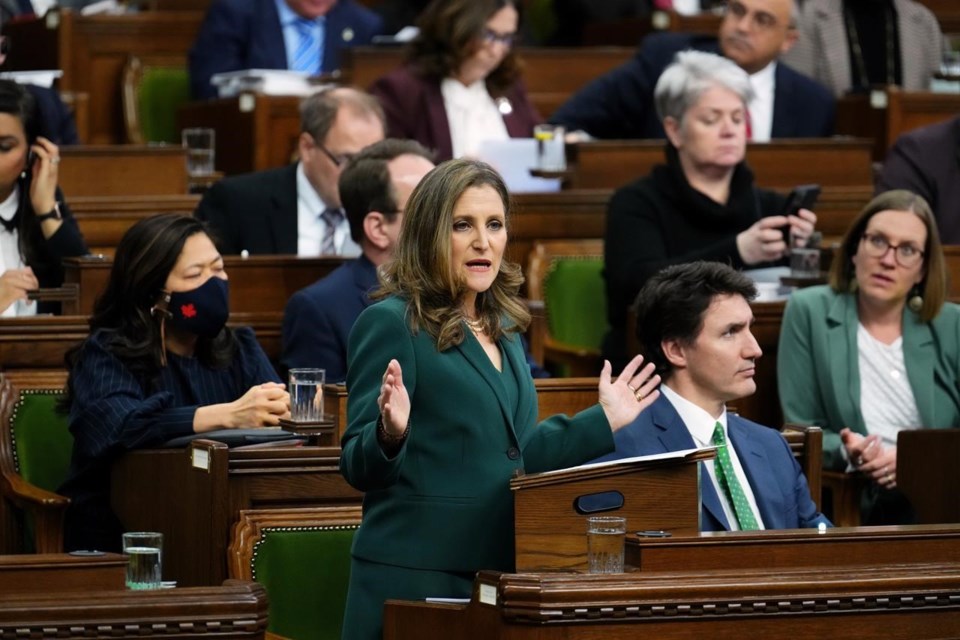OTTAWA — Even as the Liberals keep a tight focus on new clean-tech and health-care spending, the federal budget released Tuesday still projects deficits for the next five years.
Many economists are expressing disappointment in those fiscal projections, noting the government could be in trouble if the economy slows more than it is expected to — and saying the Liberals could've saved themselves headaches with better planning in previous years.
Finance Minister Chrystia Freeland promised that Tuesday's budget would be fiscally restrained in light of a slowing economy that could weigh on government coffers.
And Prime Minister Justin Trudeau insisted on Wednesday that the government remains "fiscally responsible."
But the fiscal projections in the budget show the deficit has been revised upward since the fall, showing no end in sight for deficits despite the fall budget update in November projecting a balanced budget in 2027-28.
"The idea that you're not even getting to a balanced budget within this budget horizon, is, in my mind, not fiscally responsible," said James Orlando, TD's director of economics.
Tuesday's budget forecast a $14 billion deficit in 2027-28, and higher deficits each year than had previously been projected.
As to whether the budget stayed true to Freeland's promise of fiscal restraint, former parliamentary budget officer Kevin Page likened restraint to beauty.
"It's in the eye of the beholder," he said.
Page, who heads the Institute of Fiscal Studies and Democracy, said it's not surprising that the deficit is higher than what was forecast in the fall, given that the economic outlook has since worsened.
The budget's economic projections, which are based on a survey of private-sector economists, show the economy slowing more than what was anticipated in the fall. The federal government is now expecting a shallow recession this year as high interest rates weigh on growth.
That means less tax revenue to finance the federal government's spending priorities. And if the economy slows more than expected, the federal government is at risk of running even larger deficits.
In a news conference on Wednesday, both Freeland and Trudeau defended their handling of federal finances.
"We remain fiscally responsible, even as we're investing for a better tomorrow," Trudeau said.
Freeland cited a new report by former Bank of Canada governor Stephen Poloz, which says the budget could take pressure off of the inflation situation by increasing the economy's capacity.
"Given that the demand side of the economy is already slowing sharply and most of the effects of last year’s increases in interest rates have yet to appear, it is even possible that Budget 2023 will help improve the odds of a soft landing in the economy, by buffering demand and boosting supply," Poloz wrote.
"Given the complexity of the situation, and the uncertainty around the outlook, it is simply too close to call."
While the budget announced nearly $60 billion in new spending, much of it went toward investing in clean energy and technology, as well as health care.
Page said it's "hard to criticize the government's priorities."
The Liberals were facing pressure to match U.S. incentives for clean energy and technology, while also on the hook for health-care spending and creating a federal dental plan promised in the supply-and-confidence agreement with the NDP.
But looking back, the federal government had the opportunity to better position itself by pulling back on spending in previous budgets, he said.
"We could have saved a little bit," Page said. "So yeah, we find ourselves in a situation where there's not a lot of money in the till right now."
Canada is not the only country that has allowed serial deficits in recent years. The United States has run a deficit for 20 years in a row. In the U.K., the last time a government ran a surplus was in 2000-01.
Orlando said that in recent years, governments running deficits were able to benefit from low interest rates. But as interest rates now rise, the tides are turning on the costliness of debt.
And continuing to increase spending without being able to finance it with higher revenue can build bad habits, Orlando said.
It's like with a "regular person," he said, who gets used to spending on something every year without consequence. "It's hard for them to rein that in, once they realize that their incomes aren't able to match up," he said.
This report by The Canadian Press was first published March 29, 2023.
Nojoud Al Mallees, The Canadian Press




